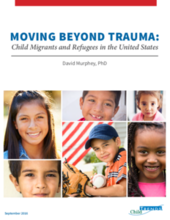Displaying 2031 - 2040 of 2509
This opinion piece from the Washington Post discusses how working to keep children with their families is a better option
This article discusses how children's immersion in social media and video games causes them to be bored with reality. This leads them to be less cooperative, which leads to parents becoming more angry.
In this article from the Washington Post, people share stories of how they found out they were not U.S. citizens after being adopted by American parents.
This news report states that nearly half a million refugee and migrant children are in the hands of smugglers.
Global men are being challenged to take on greater roles in the local, regional and international efforts to reduce the incidences of child abuse/child maltreatment in countries worldwide, and in the day-to-day rearing of global children.
In this editorial, Laura Brigs discusses the issues that children face while attempting to apply for refugee status in the United States
This is an at-a-glance look at the migration and refugee situation in the U.S., Mexico, and the Northern Triangle of Central America. The document contains general demographic data, as well as an overview of the potential threats that children face in the Nothern Triangle.
This is the executive summary for a longer report, which gives an estimate of the number of immigrant and refugee children who will enter the United States in 2016, where they come from, and the traumas they face. It includes recommendations for policy and practice.
This report gives an estimate of the number of immigrant and refugee children who will enter the United States in 2016, where they come from, and the traumas they face. It includes recommendations for policy and practice.
This document reports on the status of children who remain in psychiatric hospitals, emergency shelters, and detention facilities in Illinois, US. In 2015, there were approximately 168 children who were hospitalized beyond medical necessity; 380 children who remained in emergency shelter beyond 30 days, and the audit reported “no available data” on children who remained in a detention facility solely because placement cannot be located.




